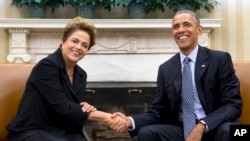The United States and Brazil, the world’s second- and seventh-largest economies, are pledging to work together to fight climate change. U.S. President Barack Obama welcomed Brazilian President Dilma Rousseff to the White House for talks Tuesday, where they discussed new initiatives to reduce carbon emissions ahead of the United Nations-sponsored conference in Paris later this year.
In a joint statement, the U.S. and Brazil announced they each intend to increase the share of renewables — beyond hydropower — to 20 percent in their respective electricity generation mixes by 2030. For the United States, this will require trebling the amount of renewable energy on the electricity grid; for Brazil, it would more than double its renewable energy output.
At the same time, Brazil also is fighting illegal deforestation. The largest South American nation says it will restore and reforest 12 million hectares of forests — an area roughly the size of England — by 2030. The Brazilian president called climate change “one of the central challenges of the 21st century” and said the initiative speaks to her country’s efforts towards limiting the global temperature increase to a maximum of 2 degrees Celsius above pre-industrial levels.
At a joint news conference following talks at the White House, Obama said the announcement builds on the progress Brazil and the United States have already made in fighting climate change.
"Since 2005, our two nations have reduced carbon emissions more than any other countries in the world,” he said. “In Brazil this includes very impressive efforts over the last decade to combat deforestation, including in the Amazon, what is sometimes called the lungs of the planet.”
Brian Deese, a senior advisor to Obama says "Brazil has cut its emissions by about 41 percent compared to 2005. It's reduced its emissions from deforestation by 85 percent from 2005 to 2012."
Deese said the United States has cut emissions by about 10 percent since 2005, and is on track to meet its 2020 emissions reductions target of 28 percent.
"Both countries come to this joint meeting of our leaders having demonstrated that we can make real progress in spurring economic growth while reducing our emissions," Deese told reporters Tuesday.
Cooperation
To convert commitments into concrete action, Obama administration officials say the presidents' joint initiative on climate change will allow Brazil and the United States to strengthen and accelerate cooperation on issues ranging from land use to clean energy. The arrangement is similar to joint initiatives the United States has in place with Asian giants China and India.
“This shows that the world’s major economies can begin to transcend some of the old divides and work together to confront the common challenge that we face, something that we have to work on for future generations," Obama said "And I am confident that this will lead to a strong outcome in Paris.”
Brazil and the U.S. are announcing their carbon emissions targets in advance of the Paris summit, as are other countries. South Korea said Tuesday it would reduce its greenhouse gases by 37 percent by 2030 — higher than the 15 to 30 percent reduction the government proposed earlier this month.
Deese said the United States was actively engaged with South Korea during the process that led to Seoul's final INDC — its Intended Nationally Determined Contribution toward greenhouse-gas controls. Obama discussed climate change during a recent telephone call with South Korean President Park Geun-hye, the White House adviser added.
"We are pleased to see the Koreans set a target that is more ambitious than the draft public scenarios that were out for consultation, and to make a target that is consistent with their prior commitments to 2020 emissions goals," Deese said.
China
The world’s top carbon polluter, China, also announced its contribution to the global climate change pact Tuesday, formalizing a previous commitment to cap its carbon emissions by 2030. Following a Paris meeting with French President Francois Hollande, Chinese Prime Minister Li Keqiang said in a statement that his country would work hard to halt its rising emissions at an even earlier date.
China said it will reduce carbon emissions per unit of gross domestic product by 60 to 65 percent by 2030, compared to 2005 levels.
Deese said the United States welcomes commitments by Brazil, China and South Korea, because those nations account for more than 70 percent of global emissions. The presidential adviser also said the United States will look for Brazil to submit its official INDC and that both nations will work together to "encourage more nations to implement more ambitious measures to cut global emissions” before the next round of climate negotiations in Paris begin on November 30.
Deese added that the U.S. and Brazil agreed to cooperate to ensure that any international agreement will be updated regularly, and to work together for more ambitious goals to control climate change in the future.




